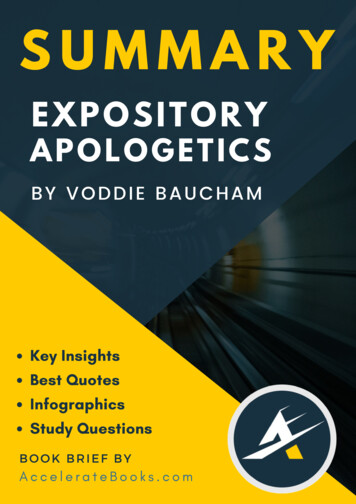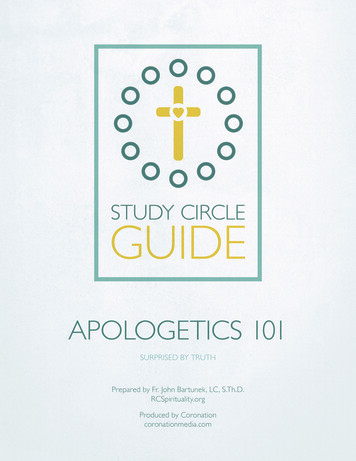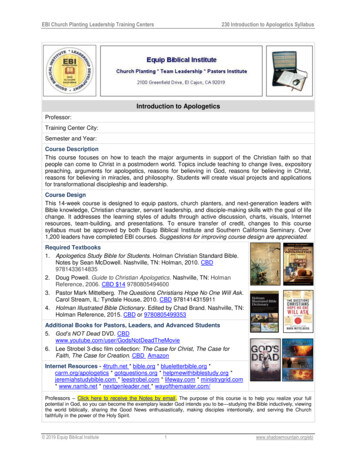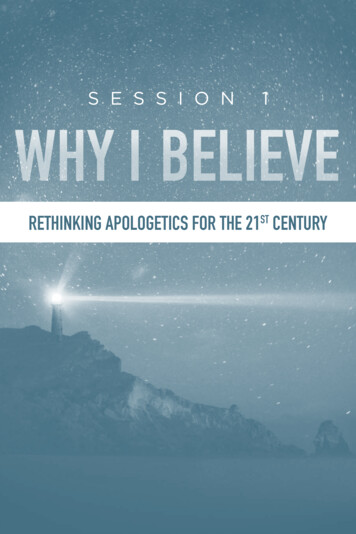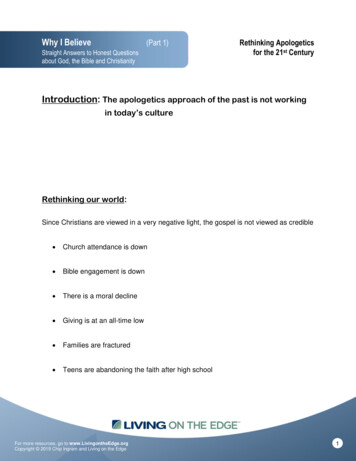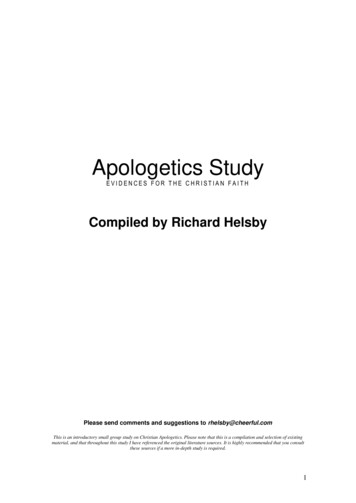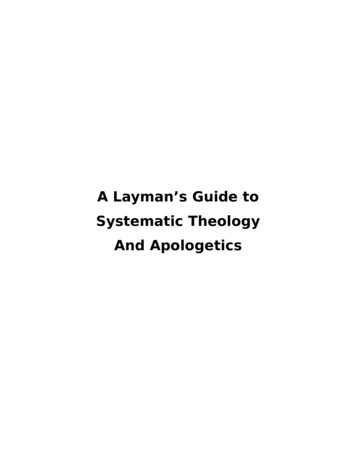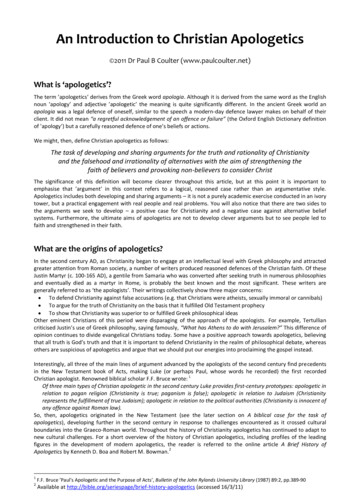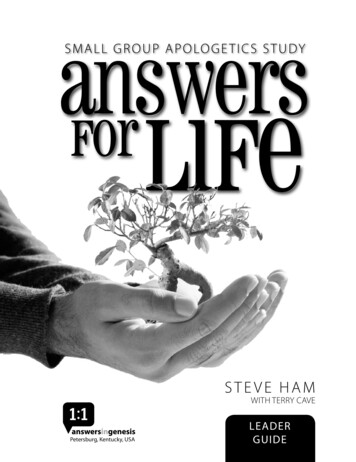
Transcription
answersS MA L L G R O U P A P O LO G ETI C S S T U DYforSteve Hamwith Terry CavePetersburg, Kentucky, USALEADERGuide
Answers for Life Leader GuideCopyright 2008 Steve HamNo part of this book may be used or reproduced in any manner whatsoeverwithout written permission from the publisher.All Scripture quotations are taken from the New King James Version. Copyright 1982 by Thomas Nelson, Inc. Used by permission.ISBN 10: 1-60092-174-4ISBN 13: 1-60092-174-2Cover design: Ingrid Beyer & Tommy MooreText design: Diane KingEditors: Steve Fazekas, Stacia McKeever, Terry Mortenson, Lori Jaworski,Gary VaterlausFor more information write:Answers in Genesis2800 Bullittsburg Church RdPetersburg, KY 41080Printed in the United States of Americawww.answersingenesis.org
AcknowledgmentI give a great deal of thanks to my good friend Terry Cave. I originallydesigned this course with his need of salvation in mind. After Christmiraculously transformed him, Terry helped me to adapt the courseto communicate in an even more relevant way to others seeking thesame answers. His assistance in sessions 2 and 5 was particularlyhelpful. Without his help, the impact of this course would greatlydiminish.Thank you Terry (and Julie) for your friendship and support and yourpassion for others who need to know Christ's salvation.
ContentsIntroduction . . . . . . . . . . . . . . . . . . . . . . . . . . . . . . . viiSession One: Is the Bible Relevant? . . . . . . . . . . . . . . . . . . . . . . 1Session Two: Who Does God Say He Is? . . . . . . . . . . . . . . . . . . . 11Session Three: The Bible & Science: Is It Credible? . . . . . . . . . . . . . . 23Session Four: Why Is There Death & Suffering in the World? . . . . . . . . . 35Session Five: What Is So Important about Jesus? . . . . . . . . . . . . . . . 45Session Six: Do You Need to Go to Church to Be a Christian? . . . . . . . . . 59
Course OverviewI developed this course over a period of two years with four separate groups of participants.The first participant was my friend Terry. I designed a study so that I could provide answersto the questions Terry had about life. They were questions about the relevance and authorityof the Bible, death and suffering, and science and origins. We had been discussing spiritualissues for many years, but these questions were a roadblock for Terry in hearing the messageof Jesus Christ. I looked through other courses on Christianity but found that none of themreally gave answers for the questions most relevant to our culture and time—the questionsmost people are really asking. I’m delighted to report that at the end of the course, the Lordsaved Terry—and his wife!After using this course with four small groups, I was overjoyed that the Lord used it to bringmany participants to Himself. I wanted to make this available for others to use.Answers for Life is for people who want to share the gospel with friends, family, or colleagues,and want to give a full understanding of the credibility of the message. The aim is to showthat the evidence we see today is explained by the historical accounts given in the Bible andthus gives credibility to the central message of hope in Jesus Christ. Participants can then beintroduced to an everlasting and life-changing relationship with Jesus Christ.You can use this course with non-Christians, who need to hear the saving gospel of Jesus Christ,and also with Christians who are looking for answers to life’s crucial questions. Answers forLife is for people who want to deal with real issues about the Bible and the message and personof Jesus Christ.How Can It be Used?The course can be used in a one-on-one setting or in a small group of people. It is designedto be used in the home to allow a comfortable and hospitable environment for people to seekanswers to real questions.Answers for Life provides an overview of each topic; suggested additional reading material oneach topic is given throughout the course. This reading is recommended but not required.The course is also designed to be conversational. Some questions simply allow people to statetheir view; others are designed to find out what the Bible says on the topic.It is important that the facilitator always approach the topic from the perspective of biblicalLEADER answers for l fe vii
Introductionauthority. This course is fundamentally about what the Bible has to say, not what human beingsthink. It is the Bible that will ultimately show God’s true authority.The Importance of QuestionsAnswers for Life is designed to engage the participant and offers many opportunities for theparticipant to ask questions. Be sure to facilitate an atmosphere in which the participant is freeto question, disagree, and express his point of view.You may not know the answer to every question but that’s OK! Simply write down the question,research the answer, and share it during the following session. For questions that are relevantto subjects covered in later weeks, discern whether to answer the question immediately or topolitely ask the participant to hold the question until the appropriate session.If the program is being run with a group, it may be necessary to answer some questions individually rather than hold up the other members of the group.While participants are entitled to share their opinion, they need to realize that you will be sharing the Word of God with them—this may not always agree with their view. But in this coursewe accept the Bible’s authority. We may not like what we find in the Bible, but we must allowGod’s Word to speak to us, rather than imposing our ideas on it. The teaching in this coursewill be based on the starting point that the Bible is true and authoritative. We will be learningto understand how the Bible explains the world we live in and how it is relevant to our lives.“Christianese”Because this course is designed to be an introduction to the Bible and Christianity, yourparticipants may not be comfortable with discussing spiritual issues, or may not understandChristian terminology. Try to avoid using “Christianese” (for example, we take it for grantedthat people understand the word sin; instead use terms to explain that sin actually means“disobedience to the commands of God”). Be sure that the environment is welcoming andencourages discussion.viii answers for l feLEADER
IntroductionMaterialsFor each session, you will need:XX DVD playerXX Answers for Life DVDXX Answers for Life Leader GuideXX The New Answers BookXX More than a CarpenterXX Copies of additional relevant material for each participantXX Writing utensilFor each session, the participant will need:XX Answers for Life Participant WorkbookXX The New Answers BookXX More Than a CarpenterXX Writing utensilSession FormatThere are six sessions in the Answers for Life course. Each session is approximately 90 minuteslong. There are three parts to each session:XX Video Introduction (3 minutes): Steve Ham introduces the session with a short video.XX Discussion Time (80–85 minutes): This section contains discussion questions and answers.Text in normal fonts (including verses and questions) is in both the leader guide and theparticipant workbook.Comments to the teacher look like this.Answers to questions look like this.Please read through the lesson thoroughly before your session begins. Make note of any areasyou’d like to elaborate on. Carefully research any questions that come to your mind.XX Video Close (3 minutes): Steve Ham closes the session with a short video.LEADER answers for l fe ix
1Video IntroductionIn this opening video, Steve Ham explains the Answers for Life program. We will spend thenext six weeks answering six questions the world has about Christianity. Steve explains thepurpose and the process of the program.Purpose: To help participants answer questions about the relevance of the Bible and JesusChrist, with the goal of leading them toward a saving knowledge of Jesus Christ.Process: To search the Bible for answers to six crucial life questions relevant to the purposeof the program.1. Is the Bible relevant?2. Who does God say He is?3. What does the Bible say about origins and science?4. Why is there death and suffering in the world?5. What is so important about Jesus?6. Do I have to go to church to be a Christian?As a result of this course, the participant will do one of three things:1. Receive Jesus Christ as Savior by faith.2. Reject the news of the gospel having truly heard it.3. Develop a true desire to investigate the truths of the gospel more seriously.LEADER answers for l fe 1
Is the Bible Relevant?DiscussionThese initial discussion questions are designed to facilitate your understanding of the status of eachparticipant’s belief (or disbelief) in God. Do you agree that everyone has a faith-based belief about God, whether they believe inGod or not?Explain that believing in God requires exercising faith that He exists. The existenceof God is not able to be proved or disproved (to do so would require God-likeomniscience).Christians accept that God exists based on the claims given in the Bible, and there isscientific evidence that is consistent with the existence of the biblical God.Because it is impossible to prove a universal negative (“there is no God”), an atheist(someone who doesn’t believe God exists) is also exercising faith that his belief aboutGod is the correct one.Follow-up questions: Why does it require faith to reject a belief in God? Do atheistsgenerally agree that they live by faith? Why? What does the term “blind faith” mean?Discuss what the participants really think about faith. Discuss what it means to have ablind faith: believing in something against all evidence to the contrary.To demonstrate what faith is, use the example involving a chair. Seeing four sturdy legson a chair is usually enough evidence for people to exercise their faith that the chair willhold them up when they sit on it.Follow-up questions: What are other examples of exercising faith in everyday life? Whatare examples of having a blind faith? (For example, believing in Santa Claus, believingin fairies, believing you passed a multiple choice test when you only guessed everyanswer.) Do you think Christianity requires blind faith? Why or why not?Discuss the responses. Find out if participants believe that faith in Jesus Christ is withoutevidence.2 answers for l feLEADER
Is the Bible Relevant? Do you agree or disagree with the following statements? “Having faith in God isintellectual suicide.” “Christianity is only for people who need a crutch.”Discuss the responses.After having asked these questions, you should have a general understanding of the participants’basis for their (dis)belief about God. This series of questions should also help to lay the foundationthat faith also requires a logical basis.Read Romans 12:2 together. This verse reminds us that God builds faith in our hearts through therenewal of our minds. The God of the Bible does not require us to check our intellect at the door butto rationally see the truth presented.Read 2 Timothy 1:12 together.The writer of the second letter to Timothy, Paul, says in 2 Timothy 1:12 that he knows whathe believes in.Definition of faith: The assurance of the heart in the adequacy of the evidence.Consider your faith in the chair you are sitting in. Was there adequate evidence for your personal assurance or belief that it would hold you up when you sat in it?Christianity is all about having faith in Jesus Christ. Over the next six weeks we will discusssome of the evidence that has provided millions of Christians with a strong basis for theirfaith in Jesus. Remember, we’re not out to prove that Christianity is true; rather, we want tounderstand the Bible’s claims, and how these claims explain the world around us. Is this statement true? “Everybody lives by a faith-based belief about God.”Any belief about God (in the affirmative “God exists,” or in the negative “God does notexist”) requires faith, since neither can be proven. We are not out to prove God existsbut to show how His Word is reliable and authentic. We have a good and logical basis forfaith.These are the questions we will be discussing:1. Is the Bible relevant?2. Who does God say He is?3. Is there credibility in what the Bible says, especially about origins?4. How can there be a God of love when there is death and suffering in the world?5. Who is Jesus and why is He so important to Christians?6. Does a person have to go to church to be a Christian?LEADER answers for l fe 3
Is the Bible Relevant?Is the Bible Relevant? If there is a God, would you expect Him to reveal Himself to us?Discuss what participants would expect from a God who created. One major expectationwould normally be that the Creator would give us some sort of understanding of whoHe is.Follow-up question: Does it make sense for the Creator to have no connection orrelationship to His creation?The Bible claims to be one way that God has revealed himself to us. So, we need to find out ifthe Bible’s claim to be a revelation from God is defendable.If the Bible is God’s revelation to us, what would you expect from it in relation to thefollowing? The degree of truthFollow up question: If the truth is coming from God, should all of it be truth or just someof it? The degree of authorityFollow-up question: If the ultimate being (God) gave us a written word, would youexpect it to simply contain authority or actually be the authority? The degree of reliabilityFollow-up question: How should a fully reliable Bible affect our life? To put it anotherway, If we knew the Bible to be 100% reliable, would we live our lives differently?This question allows participants to logically think about the expectations that shouldbe placed on Scripture. It should be reliable, authoritative truth. If Scripture is only partlycorrect or partly authoritative, what does this say about God?We should therefore consider the Bible’s claims of truth, authority, and reliability. We shouldalso consider what the Bible says about how God has revealed Himself to us.4 answers for l feLEADER
Is the Bible Relevant?Biblical Claims about RevelationFrom the Bible, we know that there are two ways in which God has revealed Himself to humanity: general revelation and special revelation. General revelation refers to the way that God hasrevealed Himself through creation, morality, and religious sense. Special revelation refers tohow God has revealed himself through the written word of the Bible and through Jesus Christ.To include every biblical reference for general or specific revelation would seriously lengthenthis study; however, we have provided a few examples.General Revelation: CreationRomans 1:20For since the creation of the world His invisible attributes are clearly seen, being understood bythe things that are made, even His eternal power and Godhead, so that they are without excuse.Acts 17:26–27And He has made from one blood every nation of men to dwell on all the face of the earth, and hasdetermined their preappointed times and boundaries of their dwellings, so that they should seekthe Lord, in the hope that they might grope for Him and find Him, though He is not far from eachof us.In these two passages the Bible claims that God has revealed Himself through His creation.The verse in Romans clearly points to the whole of creation compelling us to ask, “Where didit come from?” The verse in Acts shows that all nations are compelled to ask specifically aboutthe origin of humanity. The Bible states that if we can view the created world around us, weare without excuse in not making an effort to know the Creator.At this stage we may be tempted to speak more of creation, origins, and science; however, thesewill be discussed in the third session. For now, it is simply important to understand that it isa biblical claim that God has revealed Himself in a general way through the material creation.If this claim alone is found to have merit, the Bible is certainly relevant in guiding us throughliving in God’s created world.General Revelation: MoralityRomans 2:13–15For not the hearers of the law are just in the sight of God, but the doers of the law will be justified; for when Gentiles, who do not have the law, by nature do the things in the law, these,although not having the law are a law to themselves, who show the work of the law written intheir hearts, their conscience also bearing witness, and between themselves, their thoughtsaccusing or else excusing them.In these verses, the biblical claim is that there has been a law of morality written on the heartsof all mankind from the beginning.LEADER answers for l fe 5
Is the Bible Relevant? Have you ever wondered where a sense of good and evil or morality came from?Follow-up question: If this world all came into being by chance, then we are only acollection of atoms, and our thoughts are nothing more than a random assortment ofatoms bouncing around inside our heads. Who’s to say that what my collection of atomstells me to do is any better than what your collection of atoms tells you to do? Thereis no basis upon which to say one action is “right” while another is “wrong.” Without abiblical standard of morality given by the Creator, we have no logical reason to label anyaction as “evil.”If we are to live according to the survival of the fittest, why do we have any sense of care,fairness, or justice even in regard to things that happen to us?General Revelation: The Religiousness of ManPsalm 139:7–10Where can I go from Your Spirit? Or where can I flee from Your presence? If I ascend intoheaven, You are there; if I make my bed in hell, behold You are there. If I take the wings of themorning, and dwell in the uttermost parts of the sea, even there Your hand shall lead me, andYour right hand shall hold me.This is a small section of a psalm where the writer is showing he has a built-in sense of God.This happens all over the world where generations of all nations have been seeking God (orgods) with great religious fervor.Have you ever wondered why people all over the world are so fascinated with a “god” orreligiosity?The Bible claims that even without the Bible or any spoken word from God, people can seefrom the physical material surroundings, from a basic understanding of good and evil, andfrom a sense of the religious that there is a very strong case for believing there is a God whohas revealed Himself.The Bible also claims that God has revealed Himself in two special ways.Special Revelation: Jesus ChristJohn 1:1In the beginning was the Word and the Word was with God, and the Word was God.The gospel of John begins with talking about Jesus. Jesus is called “the Word.” We know thatthis passage is talking about Jesus because verse 14 clarifies it in this way:John 1:146 answers for l feAnd the Word became flesh and dwelt among us, and we beheld His glory, the glory as of theonly begotten of the Father, full of grace and truth.LEADER
Is the Bible Relevant?During the next session, we will discuss who God says He is in the Bible (His Word). It may be adifficult topic to consider, but for now we need to understand that the biblical claim is that Godhas come physically among us in a special way through Jesus Christ. This is another claim ofGod’s revelation of Himself to us. Notice how the first verse of John says clearly that the “word”was God and in verse 14 how the “Word” became flesh (i.e., a human being).Philippians 2:5–7 Let this mind be in you which was also in Christ Jesus, who, being in the form of God, did notconsider it robbery to be equal with God, but made Himself of no reputation, taking the formof a bondservant, and coming in the likeness of men.If the biblical claim is that Jesus is in fact God in human form, and every part of theBible directly or indirectly points toward Jesus Christ, would you consider that the Bibleis a relevant document? Why?Possible answers:If God has lived among us, then that is a very important event to know about.If the Bible is ultimately about Jesus, Jesus must be important and we should knowabout Him.If Jesus is God, we should find out about Him.Special Revelation: The BibleThe Bible claims only God’s authority2 Peter 1:19–21 And so we have the prophetic word confirmed, which you do well to heed as a light that shinesin a dark place, until the day dawns and the morning star rises in your hearts; knowing thisfirst, that no prophecy of Scripture is of any private interpretation, for prophecy never came bythe will of man, but holy men of God spoke as they were moved by the Holy Spirit.These verses make pointed comments about the Scriptures (the Bible) in relation tointerpretation, will, and inspiration. What does this passage say about the propheciesfound in the Bible?They are all from God and not man.Since the Bible is to be considered truthful, authoritative, and reliable, you would expect thatit came from the God who is the source of truth and authority—not from man. The words ofScripture are actually from God totally, with man as His writing instruments. This is a logicalconclusion if this book claims to be God’s Word and revelation to humanity.Not only this, but if God’s Word is to reveal Himself to man, you would expect it to have greatpurpose.LEADER answers for l fe 7
Is the Bible Relevant?2 Timothy3:15–17and that from childhood you have known the Holy Scriptures, which are able to make youwise for salvation through faith which is in Christ Jesus. All Scripture is given by inspiration ofGod, and is profitable for doctrine, for reproof, for correction, for instruction in righteousness,that the man of God may be complete, thoroughly equipped for every good work.Explain the meaning of inspiration: it literally means God breathed. The Greek word is theopneustos,and it is made up from two Greek words: theos (God), and pneuma (spirit, breath, or wind). So inthese passages this inspiration of God means that He breathed out His Word through men. In theirwritings in the Bible we see evidence of their human personalities and even historical research thatthey did (e.g., Luke 1:1–3). But God so worked through them that what they wrote is exactly whatHe wanted, and it was without error. So the Bible gives us God’s truth. For more information on thistopic, see chapter 6 of Nothing But the Truth by Brian H. Edwards. According to these verses, why was the Bible written?To provide us with wisdom of salvation, teaching, rebuking, guiding in the right paths,equipping for good works.Points to ConsiderXX Only God can be a fit witness concerning Himself.XX General revelation can turn us toward God.XX Only special revelation through Jesus Christ and the Bible can give us the message ofsalvation.XX If God is the perfection of truth, He can be trusted.XX If mankind is limited or corrupted, we will struggle with truth.Three descriptive words about the BibleGod’s Word is:XX Infallible: it is totally trustworthy and will not mislead.XX Inerrant: it is free from error (as originally written).XX Authoritative: in every matter it deals with, it is the sole (or ultimate) authority.If there is an all powerful Creator, wouldn’t you expect these things to be true about His writtenrevelation to us? Would you also expect these things to be testable?The Uniqueness of the Bible reveals God’s character1. Written over the course of 1,500 years (God is timeless)2. Written by more than forty authors from every walk of life: kings, military leaders,poets, peasants, philosophers, fishermen, musicians, tax collectors, shepherds (Godrules over all)8 answers for l feLEADER
Is the Bible Relevant?3. Written in different places: jail cells, palaces, dungeons, in exile, hillsides, while traveling (God is everywhere)4. Written in different moods: joy, despair, conviction, certainty, confusion, tribulation(God is an emotional being)5. Written in three languages: Hebrew, Greek, Aramaic (God communicates and reveals)6. Presents hundreds of controversial subjects with complete harmony (God is truthfuland noncontradictory)7. Presents one universal unfolding story of God’s redemption of humanity (God saves)8. Contains predictive prophecy that has been accurately fulfilled (God is in control)9. Written in different styles: historical narrative, letters, poetry, song, biography, law,prophecy (God is creative)Understanding that God has revealed Himself to us is the first step toward establishing a firmfoundation for our faith. A Christian should have an axiom (or presupposition or basis) thatGod’s revealed Word is the sole and total authority. We can chose to see the world throughGod’s perspective or our own.Accepting and understanding the whole teaching of Scripture is akin to putting on a pair ofglasses to help us to see the world better. When we embrace biblical teaching and understandhow it applies to the world around us, we have a biblical worldview. Over the next five weeks,we will see how a biblical worldview improves the way we view our lives. Since the Bible isGod’s Word, everything we learn will be taught from this book and tested for trustworthiness.Since this book is the trustworthy, revealed Word of God, it is totally relevant for every humanbeing of every age.Further ReadingThe New Answers Book, chapters 1 and 25Nothing But the Truth by Brian In 1632 the Italian scientist Galileo published a book in which he supported the view of Copernicus a century earlier that the earth is round and that the sun is the center of our solar system.The church authorities disagreed and his book was banned. Galileo was forced to renouncehis views under threat of death by the infamous Inquisition. In fact Galileo was right and heknew he was right; merely declaring him to be in error and forcing him to change his viewsaltered nothing of the truth. Today any school children who learn about Galileo know whatthe great mathematician and astronomer really believed.LEADER answers for l fe 9
Is the Bible Relevant?In the same way we cannot read the Bible honestly without coming to the conclusion thatwhat it claims for itself is an authority that allows nothing higher. No other writings, no otherdocuments, and the views of no other teachers or philosophers are ever referred to in the Bibleas carrying the same authority. Some of our great philosophers and religious leaders werealive in Bible times, including Plato, who was born 400 years before Christ, and Gautama thefounder of Buddhism, who was born a century before Plato, but they are never mentioned andcertainly never quoted in Scripture. To the human writers of the Bible, both in the old andnew testaments, there is only one authoritative Scripture.Like the authorities in Italy who punished Galileo for telling the truth, critics may not likewhat the Bible says about itself, they may even consider it to be wrong. But what they mustnever do is to pretend that it does not claim such a clear authority for itself. We may twistits words and change its meaning but, like the views of Galileo, the whole world will knowwhat the Bible really teaches about itself. Willful unbelief, ignorance, or fear of accepting theclaims of the Bible can never change the truth of them. (Brian Edwards, Nothing But theTruth (Evangelical Press, 2006), pp. 114–115)Video CloseIn this first session you have considered the following.XX Having faith in what we cannot prove still requires a logical basis. For the Christian, havingfaith in Jesus Christ does not require that we leave our intellect at the door.XX Faith is the assurance of the heart in the adequacy of the evidence.XX Since God exists and is the reason and source for all that exists, it is reasonable to expectthat He would in some way reveal Himself to us.XX The Bible claims to be God’s written revelation to man and indicates that God has revealedHimself to us through such things as creation, morality, religious sense, the written word(the Bible), and Jesus Christ.XX The Bible claims to be authoritative, reliable truth from God.XX The Bible claims to be breathed out by God through the writers.XX The Bible claims to be inerrant.XX The Bible claims to have no higher authority: From God.Bottom Line: The Bible claims to be an authentic and accurate message from the Creator, andit actually reads like one. The onus, therefore, is on its critics to prove otherwise.10 answers for l feLEADER
2What did we learn last week about the Bible being God’s revelation?Discuss with participants that the Bible is the written word of the Creator.Video IntroductionMost people have an opinion about who God is (i.e., what He is like) and if He exists at all.Some base their opinion on what their parents told them; others have had their opinion formedthrough their ethnic community; still others have formed an opinion based on their personalexperience. For the Christian who accepts the Bible as the true and authoritative Word of God,the Bible itself needs to shape our idea of who God is.The Bible describes for us who God really is. However, the descriptions given are limited. All thebooks in the world couldn’t contain a complete description of God—He is simply unfathomableand, in some ways, difficult for us to understand because there is no other being exactly likeHim. We need to keep in mind that we are not the Creator but the created. Our finite mindscannot fully comprehend Him. But we have a responsibility to understand what He has revealedabout Himself in His Word.If we could truly and completely comprehend all that there is about the Creator, this wouldshow that He is limited just like us. When we jump to our own conclusions about who wethink God is, we are simply trying to understand the incomprehensible in human terms. Thissimply doesn’t work.Only God can be a fit witness about Himself. Theref
SmaLL GrOUP aPOLOGetiCS StUDy LEADER Petersburg, Kentucky, uSA GuiDE. Answers for Life Leader Guide . I designed a study so that I could provide answers . Text in normal fonts (including verses and questions) is in both the leader guide and the participant workbook. Comments to the te
